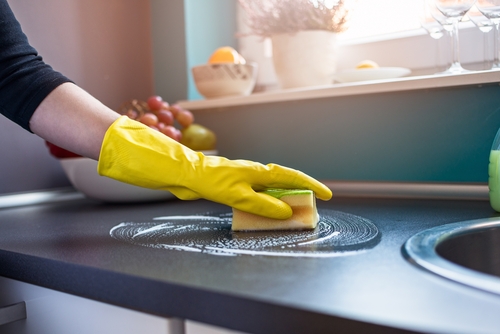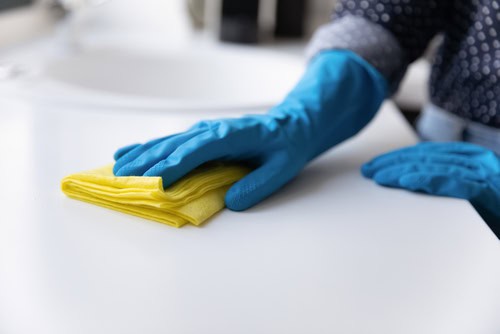
Why You Should Invest in Disinfection Services for Your Tuition Centre?
February 14, 2022
Is It Necessary to Disinfect And Clean Your Home After Covid Isolation?
March 6, 2022Cleaning and Disinfecting Kitchen Countertop The Right Way

Cleaning and Disinfecting Kitchen Countertop The Right Way – Countertops are an active part of your kitchen and should be treated as such. Whether you have granite, tile, or stainless steel counters, we can all agree that we want to take care of and clean our home countertops so they remain in good shape over time. Read on – Cleaning and Disinfecting Kitchen Countertop The Right Way!
Tips on how you can clean Countertop

1. Remove Stains.
No matter the material your countertop is made of, or if it’s pre-finished or not, food and drinks will find their way onto your counters. If you want to remove any stains caused by juices, oils, syrups, etc., you can use white distilled vinegar with a paper towel to wipe away the stains. A 50/50 mixture of white distilled vinegar and water can also be used to wipe away stubborn stains on your countertops.
2. Be Gentle on Your Countertops.
If you are using any type of abrasive cleaners on your countertop, you may cause permanent damage over time. These abrasives include scouring pads, steel wool, Comet cleanser, etc. Also, avoid using hot water while cleaning your countertops because the heat can cause the material to dry out over time.
3. Clean Countertop Faucet.
You should also clean faucets on your countertops to prevent any dirt or residue from building up. With stainless steel, you can use the same type of cleanser as your countertops, but with granite or other types of countertops, you should use mild dish soap and wipe it away with a damp cloth. If there is any mineral build-up on the faucet, carefully remove it with vinegar.
4. Let Your Countertops Dry.
After you’ve wiped away all of the solutions from your counters using a wet rag or sponge mop, you should let them dry themselves off immediately before they have a chance to dry by themselves which could lead to streaking and permanent damage over time if you’re not careful. If possible, try to wipe down your counters in a cross-hatch pattern using a dry rag before you allow them to air dry for a few minutes.
5. Rinse and Dry.
After you’ve let your counters dry off for a couple of minutes, use a fresh sponge or cloth to make sure that they’re completely free from any residue while killing off any germs at the same time.
Be very gentle when rinsing away all particles because if you scrub too hard, this can cause permanent damage over time, which is the last thing you want because it will require professional help to fix it. Once your counters have been washed with freshwater, use another clean rag immediately after to dry your counters off completely so that you can prevent streaking.
6 Prevent Streaks.
After you’ve finished cleaning, prevention is key because having clean countertops without streaks is always better than dealing with streaks and water stains which could be permanent damage in the long run.
As much as possible, try to wipe down your counters following the same cross-hatch pattern every time you clean them to avoid streaking while also avoiding any other potential damage that could make your counters look dull over time if you don’t use these tips correctly.
7. Clean With Care.
If you’re very careful when cleaning your countertops, this will make it easier to avoid streaking and other issues caused by using too much pressure, which can lead to permanent damage if you’re not careful. It’s also important to use the right amount of cleaner to prevent possible damage over time because having wet counters without enough cleaner could stain them after they’ve dried off.
8. Store Kitchen Utensils Properly.
When storing knives or any other kitchen utensil away, always make sure that you keep it clean by washing it with hot water before leaving it to dry off completely. This is because if you don’t wash items before putting them away, then the germs from those items will be left on your countertops and could cause an infection if you use these items again without washing them first.
9. Use a Cutting Board.
Another way to prevent germs and other bacteria from getting onto your counters is by using a cutting board every time you cut vegetables, fruit, meat, or anything else that can potentially carry germs or bacteria if not properly cleaned off before touching something you’re going to be eating or cooking with.
5 Tips for Disinfecting Your Countertops

1. Use Disinfecting Cleaner.
You should know that not all cleaners are created equal because there are so many different kinds out there that can create problems for your countertops in the future, especially if you have granite or any other type of material, for that matter. You need to use a disinfectant cleaner that won’t ruin the finish on your countertop and will effectively kill any germs/bacteria without causing discoloration or fading to appear over time.
2. Spray Your Countertops with Cleaner.
Spaying your countertops is recommended only when using granite or marble countertops because it’s much more porous than other materials like stainless steel or tile, among others.
Spray enough disinfectant cleaner onto your countertop and wait for a few minutes. Use a sponge or scrubby to wipe away the cleaner and any debris that may be stuck on your countertops. Make sure you get into all of the nooks and crannies to prevent bacteria from growing.
3. Wipe Your Countertops with Cleaner.
Once you’ve allowed your disinfectant cleaner to sit for about three minutes (don’t allow it to dry), it’s time to remove it using a wet sponge mop or cloth, which will kill germs while preventing streaks from appearing at the same time. After wiping away all residue completely, you should then rinse your countertops with fresh water and dry them off immediately before they have a chance to dry. You need to be very careful with your countertops because the streaking effect can ruin a good surface in no time.
4. Use Baking Soda.
What you’re going to do is mix baking soda with some liquid dishwasher soap and warm water, stir it until it forms a paste, and wipe it away using a sponge or scrubby. Once you’ve wiped away all mixture from your countertop, make sure to rinse thoroughly with fresh water before drying off completely. Be very careful not to scratch your countertop, which may cause permanent damage over time if you don’t use the right technique.
5. Vinegar and Water Mixture.
Another inexpensive homemade solution that you can try is to mix one cup of vinegar with two cups of water and spray it onto your countertops. Let it sit for three minutes before using a sponge to wipe away the solution along with any other particles, don’t forget to rinse thoroughly before allowing your countertop to dry off completely.
Remember that if you want to keep your counters looking good over time, disinfecting them is a must to prevent bacteria from growing. You should also know that if you have granite or marble surfaces, then spraying cleaners won’t be enough because they are porous materials that require a little extra work on your part for them not to look dull over time. Make sure
that when you’re wiping down your counters, use a wet rag or cloth and don’t allow any disinfectant solution to dry on your countertops. If you do, the chances are that you’ll have a bad time trying to get rid of that stain in the future.
Cleaning and Disinfecting Kitchen Countertop The Right Way –
Conclusion

In the end, you should know that you need to follow proper sanitizing procedures to keep your kitchen clean and safe for everyone who’s going to be using it. It doesn’t matter what kind of material your counters are made out of. Just make sure they’re disinfected properly every time after being cleaned to avoid getting sick from the dirt and grime leftover by improper cleaning procedures.
You can use any one of these methods to get rid of germs and bacteria on your counters. Just make sure you do so before they have a chance to grow and spread, causing you more problems in the future.




